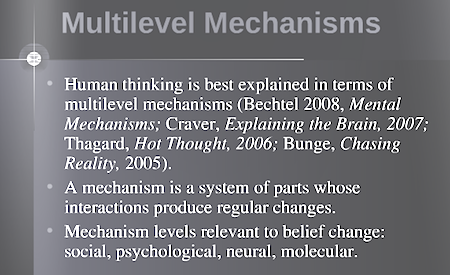
Numerous theorists have described complex systems — have described life — as comprised of levels of organization.
Examples include Kenneth Boulding’s 1956 hierarchy of complexity (framework, clockwork, control system, cell, plant, animal, human, social organization, transcendental system), James Grier Miller’s 1978 living systems theory (cell, organ, organism, group, organization, community, society, supranational system), and Tim Allen and Thomas Hoekstra’s 1992 description of the “conventional biological or ecological hierarchy” (cell, organism, population, community, ecosystem, landscape, biome, biosphere).
Philosopher and cognitive scientist Paul Thagard takes a similar approach. His central focus is the human self, which he describes as a fourfold, multilevel system of interacting mechanisms: molecular, neural, individual, social.
Thagard:
I propose that the self is best understood as a multilevel system, encompassing mechanisms that interact across four interconnected levels: social, individual, neural, and molecular. Each of these levels can be understood as a subsystem consisting of environmental influences, component parts, interconnections between parts, and regular changes in the properties and relations of the parts. This approach rejects both the holistic view that higher levels are autonomous from lower levels and the individualistic view that higher levels can be entirely explained by mechanisms at lower levels. I use the term multilevelism to stand for the view that attention to multiple levels avoids the implausible assumptions and consequences of both individualistic reductionism and holistic antireductionism.
The slide above is from a 2011 presentation, “Changing Minds About Climate Change”; the quote is from a 2012 paper, “The self as a system of multilevel interacting mechanisms”; and the video below is from a 2008 talk (“Changing Minds About Climate Change”) at the Waterloo Institute for Complexity & Innovation.

